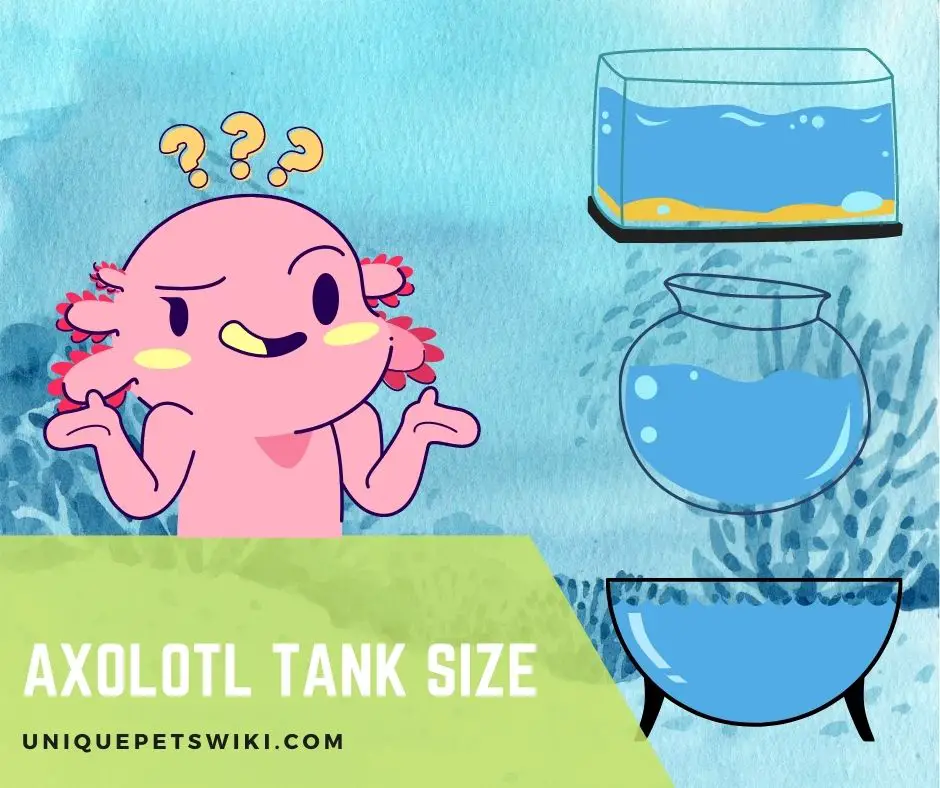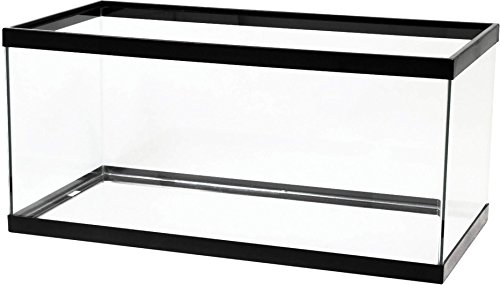I once visited a friend who housed four adult female axolotls in a 20-gallon tank. In her words “I didn’t know I’m doing something wrong. I just felt that one axolotl would be too lonely to live alone”.
That you can house an axolotl in a 20-gallon tank doesn’t mean you should keep a congress of axolotls in it – that is the least tank size you should have for one adult axolotl.
When it comes to keeping exotic animals as pets, it’s always important to do detailed research about the animal’s basic care requirements before you set off to the pet store to purchase it.
One of the biggest mistakes you should avoid is housing your exotic pet animal inappropriately because you lack the knowledge about how to keep it.
Amongst the effects it can have on your pet is affecting its growth and size.
That said, what tank size is ideal for one, two, three, or more axolotls? Well, don’t worry.
You’ve just found the most comprehensive guide for axolotl tank size and this article is going to teach you what you should consider before buying a tank for your axolotl. Keep reading.
Contents
4 Factors Affecting Axolotl Tank Size
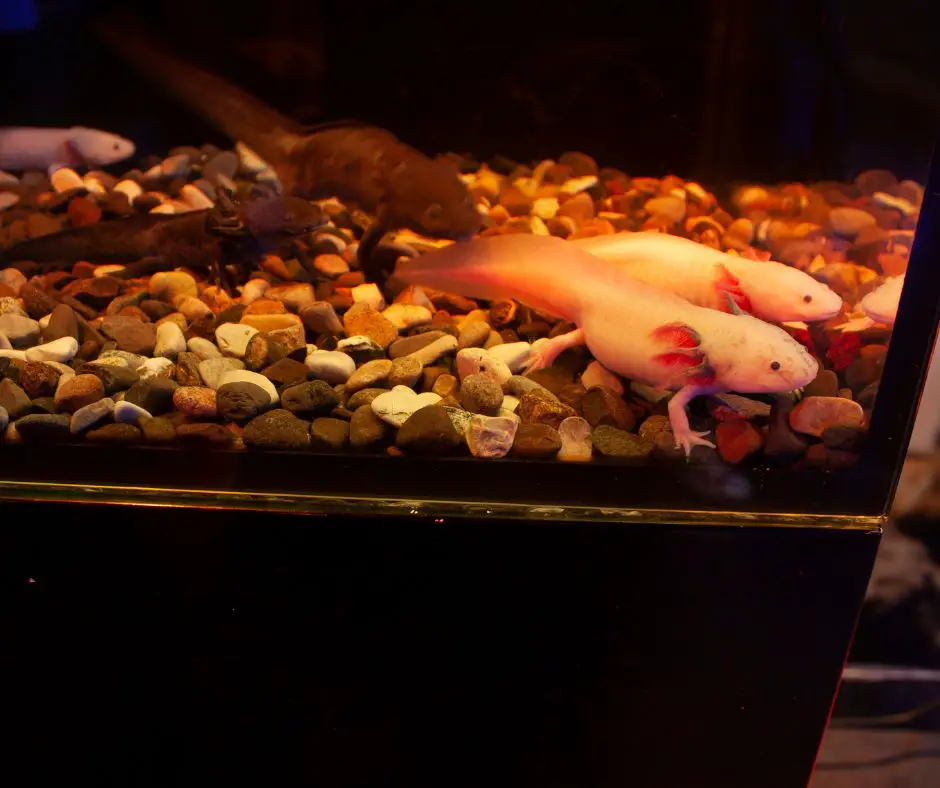
There are four things to consider when getting a tank for your axolotl or any other animal.
These things are what will determine if you’re getting a bigger or smaller tank size. These factors and how they affect your axolotl include:
- Age: Many hatchlings and younger axolotls can live fine in a 10 or 20-gallon size tank. But once they grow older (usually about 5 months old), each individual axolotl will need at least a 20-gallon size tank.
- Size: The older an axolotl gets, the larger it becomes in size. Therefore, larger axolotls require a large tank.
- Number of axolotls: The number of axolotls you intend to keep is another factor that will determine the size of the tank you should get. The more axolotls you intend to keep, the bigger/larger the tank should be.
Ideally, an adult axolotl is housed in a 20-gallon tank. But if you intend to keep more you should be looking at getting a 65 or 75-gallon tank.
A larger tank size will give your axies enough space to roam, reduce the rate of conflict and minimize stress.
- Tank mate: Before you get a tank for your adult axolotl, you should ask yourself – will you in the future want tank mates for your axie? Making your axolotl live with other species will affect the tank size. More species in the aquarium would need a bigger tank in order to avoid clashes between the animals.
In a nutshell, the rule of thumb is the larger the tank, the better.
Axolotl Tank Size: The Most Detailed Instructions
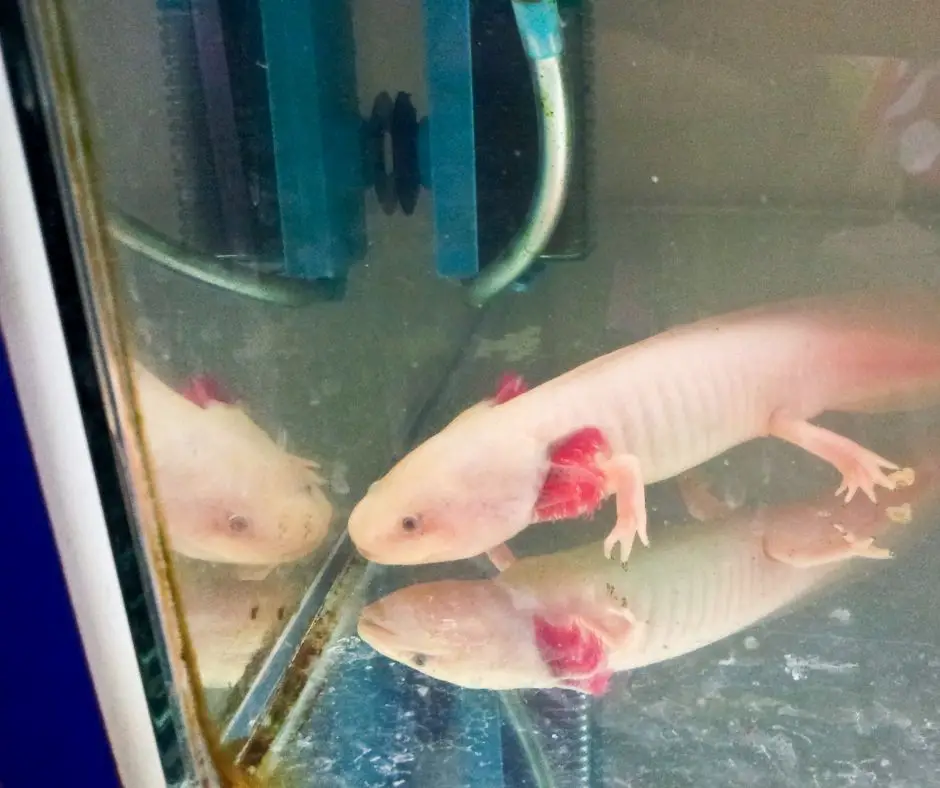
Axolotls start off as tiny hatchlings, measuring about 10-13 mm (roughly 0.5 inches). As adults, well-fed axolotls can reach 18 inches in length.
As a result, they require a lot of floor space. An adult axolotl needs at least a 20-gallon tank that is at least two feet long.
These creatures have a reputation for generating a lot of waste. Therefore, ammonia and nitrate levels would not get out of hand as rapidly in a 20 or even 30-gallon tank.
A large tank will also give the axolotl enough space to roam and play.
While some breeders claim to have successfully kept their adult axolotl in a 10-gallon tank, you’ll need to be more proactive about changing the water to keep your axolotl healthy.
| Size axolotl | Number of axolotls (maximum) | Tank size for an axolotl(L x W x H) | ||
| Minimum size | inches | Centimeters | ||
| Hatching axolotl | 100 | 10 gallons | 20″x10″x12″ | 50.8 x 20.3 x 30.5 |
| Baby axolotl | 2 | 10 gallons | 20″x10″x12″ | 50.8 x 20.3 x 30.5 |
| Juveniles axolotl | 2 | 20 gallons (long) | 30″x12″x12″ | 76.2 x 30.5 x 30.5 |
| Adult axolotl | 1 | 20 gallons (long) | 30″x12″x12″ | 76.2 x 30.5 x 30.5 |
| A pair of adult axies | 2 | 40 gallons (long) | 48″x12″x16″ | 121.9 x 33 x 40.6 |
| Three or more adult axies | 3 | 55 gallons | 48″ x 13″ x 21″ | 121.9 x 33 x 50.8 |
- 1 Axolotl – 24 inch long tank
- 2 Axolotls – 48 inch long tank
Minimum Tank Size for Axolotls
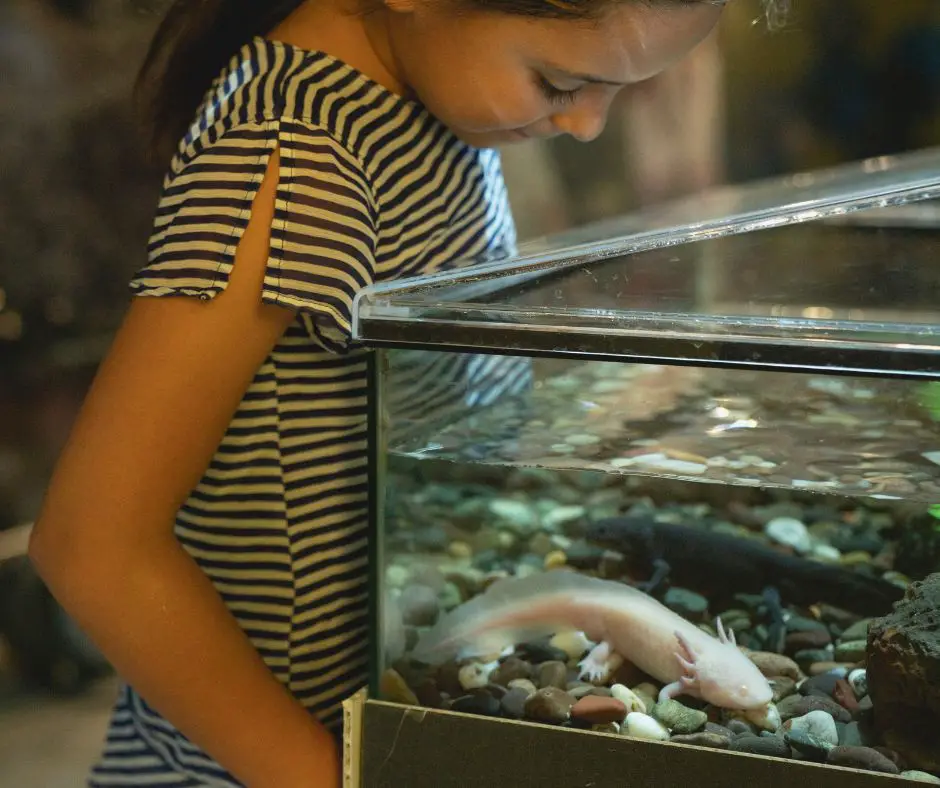
The minimum tank size you should house your axolotl is 10 gallons and this is for baby and juvenile axolotls.
Adult axolotls would require lots of space to swim, play, and grow to the right size. Hence, they require at least a 20-gallon tank.
Keeping your adult axolotl in a smaller tank will hinder its growth and make the axolotl stop growing to fit in the size of tank you provide it.
Also, as mentioned earlier, axolotls have a lot of waste. So a large tank will significantly reduce pollution and the number of weekly water changes you’ll have to make.
Best Tank Size for Axolotls
When it comes to the ideal tank size for axolotls, especially adults, the larger the tank, the better.
A larger tank size will allow you to keep plants and other decorations in the tank and also allow you to dilute the waste. On this note, the best tank size you should use for one adult axolotl is 40-gallon.
Aqueon Tank Breeder Black 36X18X16 40gal
Last update on 2022-12-29 / Affiliate links / Images from Amazon Product Advertising API
Best Tank Size for a Pair Axolotls or More
An additional axolotl would mean an additional foot or another 15 gallons of water and floor space. This will translate to at least 55 – 75 gallons.
A tank of this size will ensure they have their own space. It’ll also help to minimize fights and reduce stress.
Larger tanks help to disperse water better thereby reducing the frequency of water changes.
Note that more than three (3) axolotls should not live together except you’re really prepared to go all the way to prepare them a large pond.
Overcrowded tanks will demand that you clean and change the water frequently.
A maximum of three axolotls housed in a 75-gallon tank will still be healthy and happy. However, you must meet their minimum space requirement and make sure they are all the same size (age).
Axolotl Tank Size And Its Related Problems
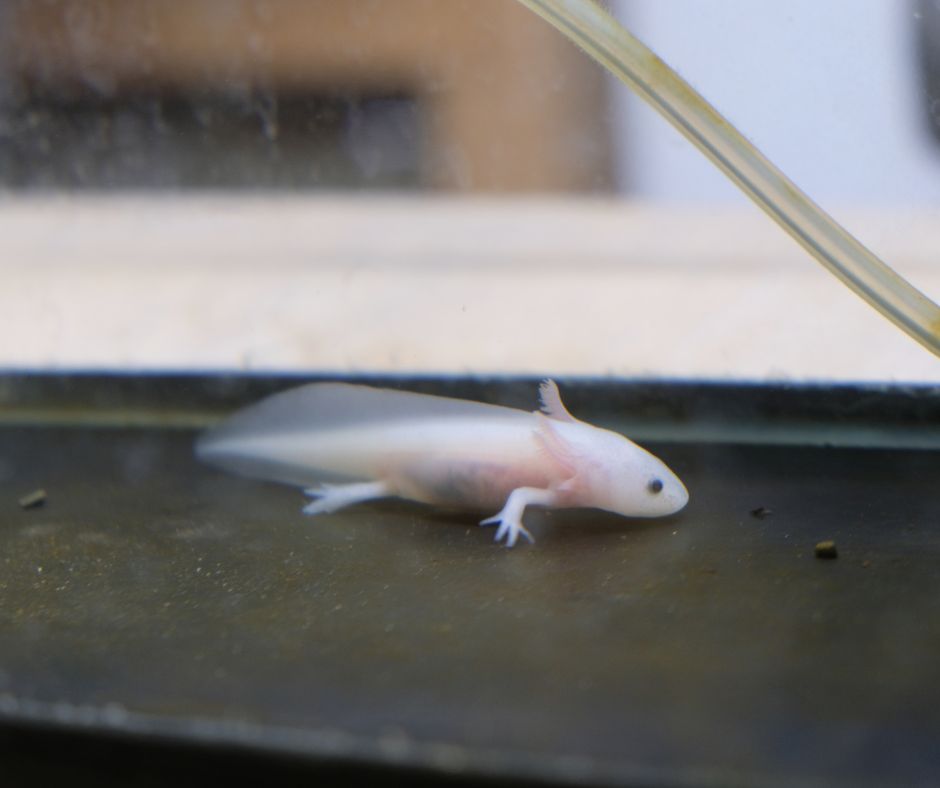
- Axolotl size:
Adult axolotls can grow to be 6 to 18 inches (15 to 45 cm) long. So if you keep them in a small tank, they will not grow to their full size. Instead, they will adapt to fit in the tank size.
When getting a tank for your axolotl, the size of the axolotl will determine what tank size you should buy.
Adult axolotls kept in a small tank will not have ample space to move and explore freely as they would in the wild.
- Axolotl setup:
The first step in setting up your axolotl habitat is to find a suitable tank size and a suitable spot for it in your house.
Because getting a suitable tank size for your axolotl is as important as feeding it the right food. Even how cluttered you choose to decorate the tank will be determined by the size of the tank.
Once this is done, go ahead and decorate/set up the tank to simulate their wild habitat.
What you’ll need include substrates, a gravel vacuum, a sponge or bubble filter, an aquarium chiller, and many others.
Several things come to play to add up to the overall cost of an axolotl. Starting from the initial head cost, water treatment, cost of food, tank, supplies, vet care, and so on.
The cost of the breed is rather low, ranging between $30 and $100.
However, the cost of setting up the tank is quite high – this is also based on the quality of the materials you go for, including the size and suppliers.
Aqueon Aquarium 20 Gallon Long
- High quality glass construction with dimensions 30.25" x 12.5" x 12.75"
- For freshwater and marine applications
- Clean silicone edges (select sizes available in clear or black)
- Always include a drip loop when plugging aquarium appliances into the electrical outlet
- Place aquarium on stand able to safely bear the weight of a filled aquarium
Last update on 2022-12-29 / Affiliate links / Images from Amazon Product Advertising API
Final Words
Axolotls have been known to reach a body length of about 18 inches in captivity.
This means that the minimum tank size you should keep an adult axolotl is 20 gallons. If you want to keep more than one axolotl in your tank, you should increase the tank size accordingly.
Remember, you should not crowd the tank with too many axolotls.
Overcrowding the tank with too many axolotls will increase the likelihood of a disease outbreak and will make it harder to keep the water quality high enough.
